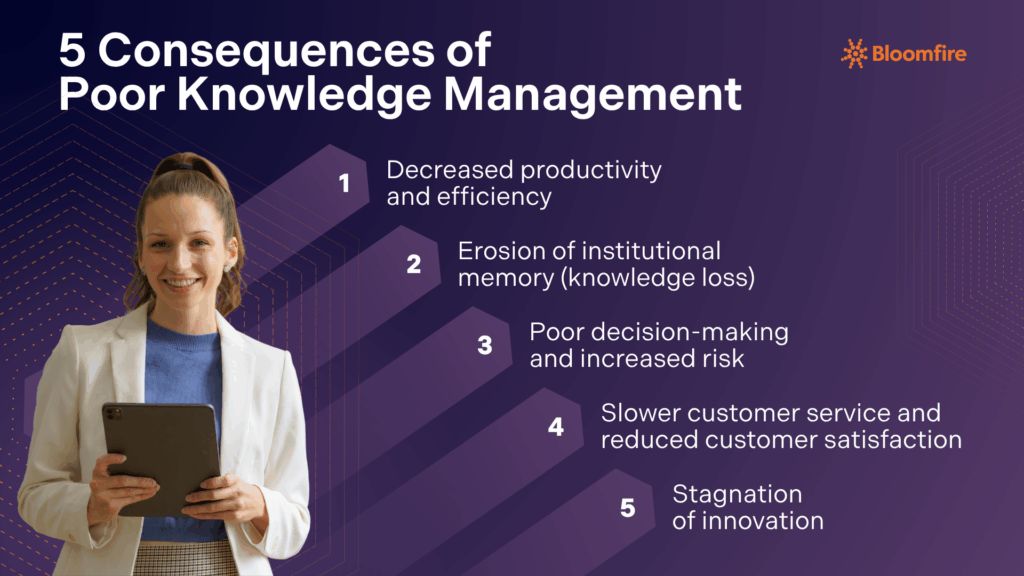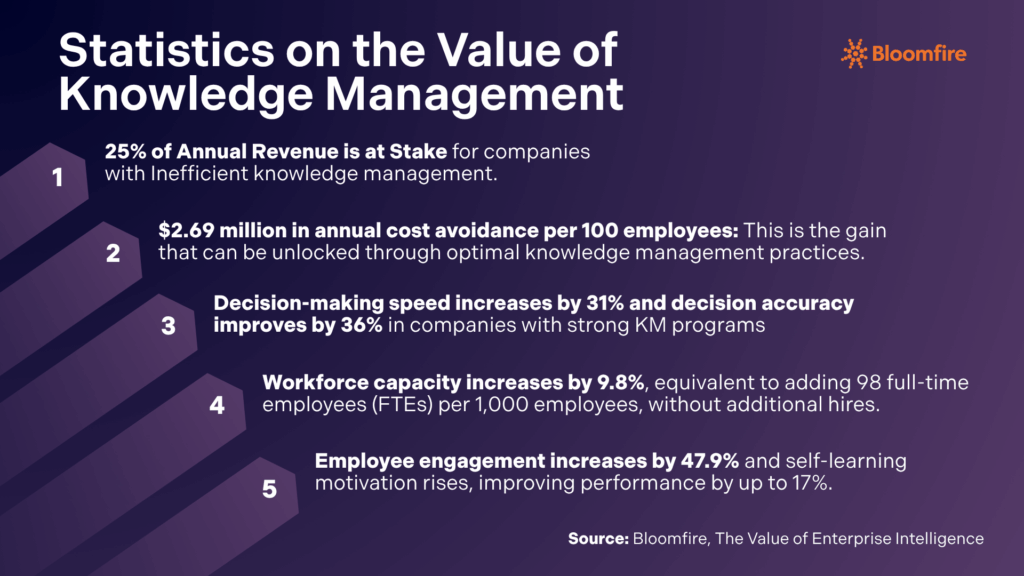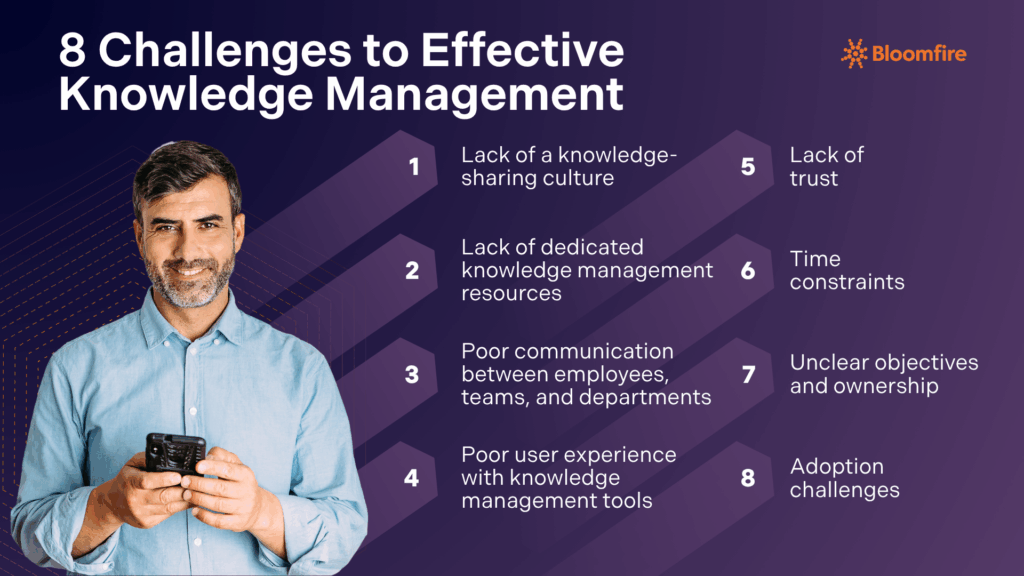Why Is Knowledge Management Important for Organizations in the Age of Turmoil

SUMMARY: Effective knowledge management creates a structured approach to organizing, storing, and disseminating information across teams, which is essential when facing continuous business challenges.
The past several years have been characterized by tumultuous change, including a pandemic, rapid technological advances, the shift to hybrid work, and high inflation. To successfully navigate these constantly evolving circumstances, companies possess a vital, yet often decentralized, resource: their employees’ collective knowledge.
Each employee brings a unique background, experience, and know-how, creating an immense internal wealth of information that forms the organization’s lifeblood. However, this collective knowledge is only valuable if it is effectively shared; hoarding information or relying on outdated data (knowledge inertia) severely hinders innovation and growth in a volatile environment.
Establishing an effective knowledge management approach ensures every employee can access and benefit from their colleagues’ expertise. Learn more about its value, especially during challenging business periods, and how to ensure its adoption.
Why Is Knowledge Management Important Today?
Knowledge management (KM) is vital in today’s turbulent age because it provides the structure necessary to navigate frequent and profound disruptions, such as rapid technological advancements, political instability, and economic threats. The ability to collect, store, and quickly disseminate the collective expertise and lessons learned across an organization ensures continuity and agility.
A robust KM system preserves critical institutional knowledge, preventing the loss of valuable know-how when employees leave or when operations need to pivot quickly in response to a crisis. Making informed, data-driven decisions is paramount during times of uncertainty, and KM ensures that employees have access to the most relevant and up-to-date information, which significantly speeds up problem resolution and reduces the risk of repeating past mistakes.
KM’s importance is underscored by the tangible business outcomes it drives, particularly in enhancing efficiency and innovation. For instance, 98% of employees believe they could be more productive when knowledge is shared across departments, highlighting both the human desire and business necessity for improved information flow.
Establishing a culture of sharing helps eliminate redundant work, accelerates time-to-market for products, and supports continuous process improvement. This enhanced operational capability and greater agility highlight the importance of knowledge management in an organization. It provides a necessary competitive advantage for organizations striving not just to survive, but thrive, in an ever-changing global marketplace.
10 Proven Impacts of Knowledge Management
Effective internal knowledge management across an organization can provide each individual employee with access to up-to-date, accurate company information—but the advantages go even further than that. A few key benefits of knowledge management include:

1. Increased productivity
Employees who use a robust KM system spend 3.9 fewer hours per week searching for information compared to those without. This leads to increased productivity and less employee frustration, which can help improve employee satisfaction.
Knowledge management makes information convenient and easily accessible, empowering employees to be more efficient and productive. It also enables organizations to retain knowledge of experienced employees even if they leave to pursue other opportunities or retire. KM is also crucial for maintaining service quality and productivity during workforce disruptions, such as high turnover or the shift to hybrid work.
2. Operational efficiency
The level of access provided by seamless knowledge management allows teams to execute processes faster, standardize best practices, and significantly reduce duplicated efforts across departments. These results are essential for maintaining consistent, high-quality output even when business processes are rapidly changing.
According to a McKinsey Global Institute Report, a strong KM system can reduce the time lost in searching for information by up to 35% and boost organization-wide productivity and efficiency by 20-25%. Improving operational efficiency through KM is critical because it enhances an organization’s agility and resilience in the face of market threats.
3. Employee retention
When an organization effectively organizes and shares its critical information, it enhances the daily work experience, reducing the frustration and burnout often caused by struggling to find necessary data or reinventing solutions. KM provides employees with the resources they need to succeed, fostering a sense of competence and empowerment.
Research indicates that when both leaders and organizations support skill-building, employees are nine times more likely to work for their company one year from now. This shows that by making knowledge sharing and skill acquisition central to the work experience, KM transforms the workplace into one that promotes growth, reduces job-related anxiety, and makes employees feel more connected to the organization’s success.
4. Customer satisfaction
An accessible knowledge base ensures customer service agents can rapidly resolve issues. KM is also the engine for effective self-service options, such as FAQs, help centers, and chatbots, which customers increasingly prefer for quick answers to simple queries. Its ability to standardize information across all channels means a customer receives the same, correct answer whether they call, chat, or use a website. This directly reduces frustration caused by having to repeat information or receiving conflicting solutions.
The majority of consumers rely on digital resources to resolve issues, underscoring the importance of a well-maintained public knowledge base. Research indicates that 45% of consumers want their issues resolved in the first interaction, which a KM system makes more achievable. Furthermore, as established above, effective KM reduces the time agents spend searching for information by up to 35%, directly translating to quicker response times and improved productivity
5. Cost savings
Turmoil often forces companies to adapt quickly, but without codified knowledge, employees waste time searching for answers, repeating previous work, or making mistakes that require costly rework. KM mitigates these expenses by providing a single source of truth, which drastically reduces the hours knowledge workers spend searching for necessary documents or expertise.
Access to the right information at the right time can cut a service provider’s average response time by anywhere from one-fifth to four-fifths. Meeting this expectation through a robust KM base translates to lower call volumes, shorter handling times for agents, and a resulting decrease in overall support operating expenditures.
6. Accelerated onboarding
New hires no longer rely solely on busy colleagues or managers, which reduces the learning curve and prevents the frustrating experience of searching for scattered, outdated information. Employees who go through a formal onboarding process achieve full productivity 34% faster, demonstrating the direct efficiency gains structured knowledge provides.
69% of employees are more likely to stay with a company for three years if they experience great onboarding. This improved retention directly reduces the recurring, high cost of replacing staff, making KM a fundamental strategy for stabilizing the workforce and protecting the bottom line against economic uncertainties.
7. Faster organizational decision-making
According to a survey by International Data Corporation (IDC), organizations that implemented KM strategies reported measurable benefits, including a 39% improvement in business execution and better decision-making. The numbers demonstrate a direct correlation between accessible knowledge and enhanced performance.
When employees lack access to adequate information, they can’t make informed decisions. Consider a customer support agent, for example. If he doesn’t know the company policies regarding refunds, he may incorrectly deny a customer’s refund request—and cause the issue to erupt into a much bigger problem. With access to up-to-date and accurate company information, employees can make informed decisions quickly, which provides significant long-term benefits.
8. Improved collaboration
According to McKinsey research, 58% of Americans work remotely at least one day per week. Companies must now consider how to not only encourage collaboration between on-site employees, but also among remote workers.
A thoughtful knowledge management strategy can provide all employees—both on-site and remote—with easy access to trusted, accurate information and a shared understanding of projects and problems, enabling them to work together more effectively.
9. Enhanced employee morale
There are few things more frustrating than not knowing how to do your job—and not knowing where to find the information you need to figure it out. One of the advantages of knowledge management is that it puts information at your employees’ fingertips, so they have everything they need to perform their roles proficiently without spending hours searching for how-to documents. This can ultimately boost morale and employee satisfaction.
10. Greater creativity and innovation
Too often, companies do things a certain way simply because that’s “just the way they’ve always done it.” Prioritizing knowledge management and a knowledge-sharing culture, on the other hand, encourages dialogue and information exchange between employees, which can spark new ideas and perspectives, leading to innovative and creative solutions to company challenges.
Consequences of Poor Knowledge Management
The benefits of strategic knowledge management remain promising. But what if you miss the proper implementation of your KM system?
Failing to prioritize and implement effective knowledge management practices can inflict significant damage across an organization, severely hindering its ability to function, especially during times of instability and change. When institutional knowledge and information are siloed, disorganized, or lost entirely, teams cannot access the critical information needed to perform their jobs efficiently. This neglect leads to a cascade of negative outcomes that undermine productivity, stifle innovation, and directly impact the company’s financial health.

1. Decreased productivity and efficiency
Employees waste valuable time searching for documents, recreating information that already exists, or interrupting colleagues for answers. This “re-inventing the wheel” phenomenon means projects take longer, deadlines are missed, and the overall capacity of the workforce is drastically reduced.
2. Erosion of institutional memory (knowledge loss)
High employee turnover—a common characteristic of the modern job market—results in critical knowledge leaving when staff members depart. Without a KM system to capture that expertise, the organization must spend significant time and resources retraining replacements or solving problems that were already addressed in the past.
3. Poor decision-making and increased risk
Decisions made without access to the most current and accurate data, customer feedback, or historical project lessons are inherently risky. This absence of reliable, contextual knowledge can lead to strategic missteps, financial errors, compliance failures, and substandard product development.
4. Slower customer service and reduced customer satisfaction
When customer support agents lack quick, easy access to a knowledge base containing troubleshooting guides and best practices, resolution times skyrocket. Frustrated agents deliver poor service, leading to increased customer churn and significant damage to the brand’s reputation.
5. Stagnation of innovation
Innovation often springs from the cross-pollination of ideas and lessons learned from past successes and failures. When knowledge is hoarded in departmental silos or is difficult to find, employees cannot build upon the collective intelligence of the organization, resulting in a culture that resists change and a pipeline devoid of fresh ideas.
The consequences of poor knowledge management are far-reaching and costly, turning potential efficiencies into liabilities that organizations can ill afford in today’s unpredictable environment. Investing in a robust KM system is not merely an operational luxury but a fundamental necessity for building resilience and ensuring continuous function and innovation.
Statistics on the Value of Knowledge Management
Quantifying the financial and operational impact of KM reveals a clear business case for prioritizing knowledge flow across all departments. Here are five powerful statistics from our Value of Enterprise Intelligence report that illustrate the core value of a strong knowledge management strategy:

1. 25% of annual revenue is, on average, impacted by inefficient knowledge management practices. This figure highlights the significant financial risk posed by siloed or inaccessible knowledge, translating to billions of dollars in value at risk for large enterprises.
2. $2.69 million in annual cost avoidance per 100 employees can be unlocked through optimal knowledge management strategies. These savings are primarily achieved through cutting costs related to excessive information searches, duplicated tasks, and inefficient onboarding.
3. Decision-making speed increases by 31% and decision accuracy improves by 36% in companies with strong KM programs. Access to vetted, contextual knowledge enables staff to act faster and with greater confidence, leading to better strategic outcomes.
4. Workforce capacity increases by 9.8%, equivalent to adding 98 full-time employees (FTEs) per 1,000 employees, without additional hires. This massive productivity lift is a result of eliminating redundant work and the time wasted searching for fragmented information.
5. Employee engagement increases by 47.9% and self-learning motivation rises, improving performance by up to 17%. Providing employees with the tools to find and share expertise creates a culture of empowerment, significantly boosting morale and retention.
The statistical evidence makes a clear business case: KM converts wasted time into productive output and transforms customer frustration into satisfaction. Companies that prioritize KM are demonstrably better equipped to navigate turmoil, translating knowledge into tangible financial success and a more resilient operational future.
Concrete Applications of Knowledge Management in Organizations
Knowledge Management has become a strategic tool, essential for maintaining stability and efficiency amid constant external pressures. It enables organizations to codify internal wisdom, making it accessible and actionable across teams.
KM’s practical applications are diverse and directly address the challenges of instability:
- Customer service excellence: Providing instant, consistent answers across all channels, regardless of agent experience.
- Employee training and onboarding: Accelerating the time-to-competency for new hires amidst high turnover.
- Process standardization: Documenting best practices to ensure consistent quality and compliance, even with a distributed workforce.
- Innovation and product development: Capturing and sharing lessons learned from past projects to avoid costly rework.
- Risk management: Centralizing documentation on regulations and compliance requirements to swiftly respond to shifting legal landscapes.
- Decision support: Giving executives and managers real-time access to accurate operational data and market intelligence.
- Sales enablement: Equipping the sales team with up-to-date competitive intelligence and product information to close deals faster.
- Preserving institutional memory: Capturing the expertise of retiring or departing employees to protect critical organizational knowledge.
These use cases illustrate how KM transforms internal chaos into corporate capability. For example, standardizing crisis response protocols through KM minimizes response time during an unexpected market disruption, saving resources and reputation. Additionally, centralizing customer feedback and market intelligence shortens the product development cycle, allowing organizations to outpace competitors.
Examples of organizations with great knowledge management
The success of a great KM strategy can be seen in the outcomes achieved by companies across diverse industries. The following examples clearly demonstrate that strong knowledge management is not merely a technical exercise but a crucial business imperative:
- Insperity: The professional employer organization utilized KM to break down severe departmental silos. They saw a 400% increase in questions answered by peers versus a small content management team, significantly empowering staff to find fast, peer-validated answers.
- ActiveProspect: This marketing intelligence company successfully consolidated four existing knowledge management systems into a single, centralized platform. This centralization saved platform administrators considerable time on content updates and provided employees with a single trusted location for all necessary information.
- ChampionX: The multinational chemical and technology provider transformed static, siloed documents into dynamic, accessible knowledge by migrating technical manuals and operational guides to a unified platform. This strategic move ensures that critical information is searchable and up-to-date for all employees, minimizing costly operational errors and enabling rapid onboarding of new hires in a high-complexity industry.
Organizations that prioritize sharing and organizing their collective intelligence are far better positioned to overcome the constant challenges of today’s turbulent environment. Implementing a robust KM strategy allows companies to stabilize operations, accelerate growth, and maintain a necessary edge in a constantly shifting global market.
ROI of Knowledge Management: Evidence of Its Value
Knowledge management isn’t just a cost center; it’s a strategic investment that delivers a measurable return on investment (ROI), a necessity in today’s unpredictable economic climate. Documented evidence confirms that companies applying KM principles gain a decisive advantage through increased efficiency, reduced operational costs, and enhanced customer experiences.
The financial value of KM becomes clear when examining its impact on productivity and service delivery. Organizations that effectively share information see a significant reduction in the time employees spend searching for documents or answers. This time savings translates directly into more hours dedicated to core tasks and innovation, effectively increasing the usable bandwidth of the entire workforce.
For example, providing relevant, contextual knowledge to an employee or customer can reduce a service provider’s time to answer by 20% to 80%, a substantial boost to operational throughput. Furthermore, a well-managed knowledge base significantly lowers training expenditures and accelerates time-to-market for products.
New hires who experience structured onboarding, heavily supported by KM tools, become fully productive much faster, cutting the high costs associated with extended training periods and high turnover. Cost savings are also realized in customer service, where robust self-service options deflect calls from costly human agents.
The ROI of Knowledge Management is realized through both tangible cost reductions and intangible benefits, such as faster innovation and improved decision-making. These benefits—spanning cost savings, efficiency gains, and improved workforce agility—equip the organization to withstand the volatility of the age of turmoil.
Challenges to Effective Knowledge Management
While the benefits of knowledge management are clear, it doesn’t come without challenges. Here are a few of the obstacles you may face when developing and implementing a knowledge management strategy:

1. Lack of a knowledge-sharing culture
For an organization to truly benefit from knowledge management, knowledge sharing must be part of employees’ day-to-day lives—but if it’s not already ingrained in your organizational culture, it can be easy for workers to overlook. Rather than focusing on documenting and sharing knowledge, many workers (understandably) prioritize their main job responsibilities or inadvertently waste time searching for information that turns out to be outdated or irrelevant.
2. Lack of dedicated knowledge management resources
Effective knowledge management requires an established KM framework that outlines the processes, strategy, tools, and people required to make the initiative work. If you don’t have those resources, it’s easy for knowledge management to fall by the wayside.
3. Poor communication between employees, teams, and departments
Individual teams and departments often operate in silos, lacking a deep understanding of what others are doing. This can easily lead to information hoarding, rather than encouraging those employees to share information and build collective knowledge within the company.
4. Poor user experience with knowledge management tools
The tools you use for knowledge management—such as the advantageous knowledge base—can have a big impact on the success of your initiative. If the platform or tool is inconvenient or hard to navigate, employees will be less likely to use it.
5. Lack of trust
Trust plays a vital role in knowledge management. Employees must trust that they can share ideas without being criticized and be confident that the information won’t be misused. If workers do not feel that they can trust their colleagues or leadership team, they may be hesitant to collaborate.
6. Time constraints
Knowledge management requires employees to take time away from their regular, core responsibilities. For example, to document tips, best practices, or procedures, customer support agents must take time away from answering the phone. This can temporarily increase call wait times and has the potential to impact customer satisfaction. As a result, this can make it difficult for some departments to prioritize knowledge management.
7. Unclear objectives and ownership
Who is responsible for documenting knowledge? What are the goals of your knowledge management initiative? Without clear objectives and ownership, these initiatives can be disorganized and ineffective.
8. Adoption challenges
Adopting a new platform for knowledge management can be challenging and time-consuming, and it often requires substantial IT resources to implement—especially for large organizations with diverse technical requirements.
Although the challenges may seem overwhelming, fortunately, there are many strategies you can use to overcome these issues and promote effective knowledge management. These strategies range from implementing the right technological tools to fostering a cultural commitment to sharing and accessibility across all teams.
5 Strategies for Promoting Effective Knowledge Management
So how do companies that want to build collective knowledge actually meet that goal? They can encourage knowledge management with the following strategies:

1. Develop a Knowledge Sharing Culture
Within your organization, knowledge should be viewed as a valuable asset to be shared, and the practice of knowledge sharing should be celebrated and encouraged. Creating this mindset could involve recruiting members of the leadership team to serve as champions of the knowledge management initiative, rewarding employees who participate with bonuses or swag, or recognizing workers who actively share information through emails or shout-outs during companywide town hall meetings.
2. Use Technology
The right technology can make all the difference in the success of your knowledge management initiative. A robust knowledge base can make it easy for employees to contribute information and find the knowledge they need to perform their roles better.
For instance, some platforms include deep search functionality that indexes every word in every file—including audio and video. A purpose-built platform like Bloomfire will capture common questions and answers from employees, and support you in generating a comprehensive FAQ section. These types of features make it easier and more convenient to access company knowledge, and save subject matter experts’ time, as they don’t have to answer the same questions over and over again.
3. Promote Learning and Development
Employees will naturally use a knowledge base more often when they feel proficient with the technology and processes. To encourage this, offer learning opportunities that allow workers to maximize your organization’s learning base and knowledge management framework. This could be an internally developed program or an established certification program from a reputable organization, such as the Knowledge Management Institute.
4. Foster Community Engagement
To build trust among your workforce, encourage employees to interact with other departments and find ways to share information. Facilitating cross-organizational conversations can foster a community, employee engagement, and a learning culture within the company.
5. Establish Clear Ownership
Part of building an effective knowledge management framework is clarifying who owns particular information. For example, the HR team may be responsible for all company policies, while the product marketing team owns all in-depth product information, brochures, and instructional guides. With this framework established, everyone will know exactly who to ask or where to look when they have questions or need help understanding something.
Organizations, and the employees within them, possess lots of knowledge—but too often, it goes unshared, gets lost in people’s inboxes, or gets saved in a never-ending labyrinth of folders, to the detriment of the entire company.
With a clear understanding of the importance of knowledge management, your organization can begin to develop and implement a framework that enables each employee to feel comfortable and freely share their knowledge. And that will ultimately lead to a wealth of benefits, from increased productivity to an empowered and action-oriented workforce.
The Evolution of Knowledge Management
Knowledge management has evolved beyond simple documentation storage to become Enterprise Intelligence, transforming static information into an active, connected system that surfaces contextual insights to every user at the moment they need it. This shift maximizes the ROI of knowledge assets, thereby driving superior business outcomes and agility. Now is the time to transition your foundational KM practices into a strategic EI framework to unlock the full competitive value of your institutional knowledge.
Unlock Your Enterprise Intelligence
Measure your company’s knowledge-sharing maturity to maximize ROI and business agility.
Learn More
Organizations implement KM systems by first defining their knowledge needs and then selecting technology, such as specialized software, that supports the capture, storage, and retrieval of information. Successful implementation requires fostering a culture of sharing where employees are trained and incentivized to contribute and utilize the shared knowledge base.
A primary challenge is knowledge inertia, where employees are reluctant to share their expertise or prefer to use outdated, familiar information rather than the current system. Organizations also struggle with the technical task of classifying and maintaining the vast amount of collective knowledge to ensure it remains accurate and easily searchable.
KM can transform organizational culture into one that is collaborative and learning-focused, moving away from knowledge hoarding toward open exchange. It establishes a standard that informed decision-making is expected, embedding continuous learning and improvement into daily operations.
Bloomfire centralizes disparate information, allowing employees to quickly find answers and resources without interrupting colleagues, which drastically reduces search time. This rapid access to institutional knowledge empowers staff to be more autonomous and efficient, accelerating project completion and decision-making.

How to Improve Customer Service in Call Centers: 21 Ways to Enhance Contact Center Experience

Innovative Ways Companies Are Using Knowledge Management

How to Implement a Knowledge Check in 6 Steps

Estimate the Value of Your Knowledge Assets
Use this calculator to see how enterprise intelligence can impact your bottom line. Choose areas of focus, and see tailored calculations that will give you a tangible ROI.

Take a self guided Tour
See Bloomfire in action across several potential configurations. Imagine the potential of your team when they stop searching and start finding critical knowledge.